Dawkins’ barbed blanket dismissiveness comes up far too often in discussions of the design inference and related themes. Rarely, explicitly, most often by implication of a far too commonly seen no concessions, selectively hyperskeptical policy that objectors to design too often manifest. It is time to set this straight.
First, we need to highlight fallacious, crooked yardstick thinking (as exposed by naturally straight and upright plumb-lines). And yes, that classical era work, the Bible, is telling:

Notice, a pivotal point here, is self-evident truths. Things, similar to 2 + 3 = 5:
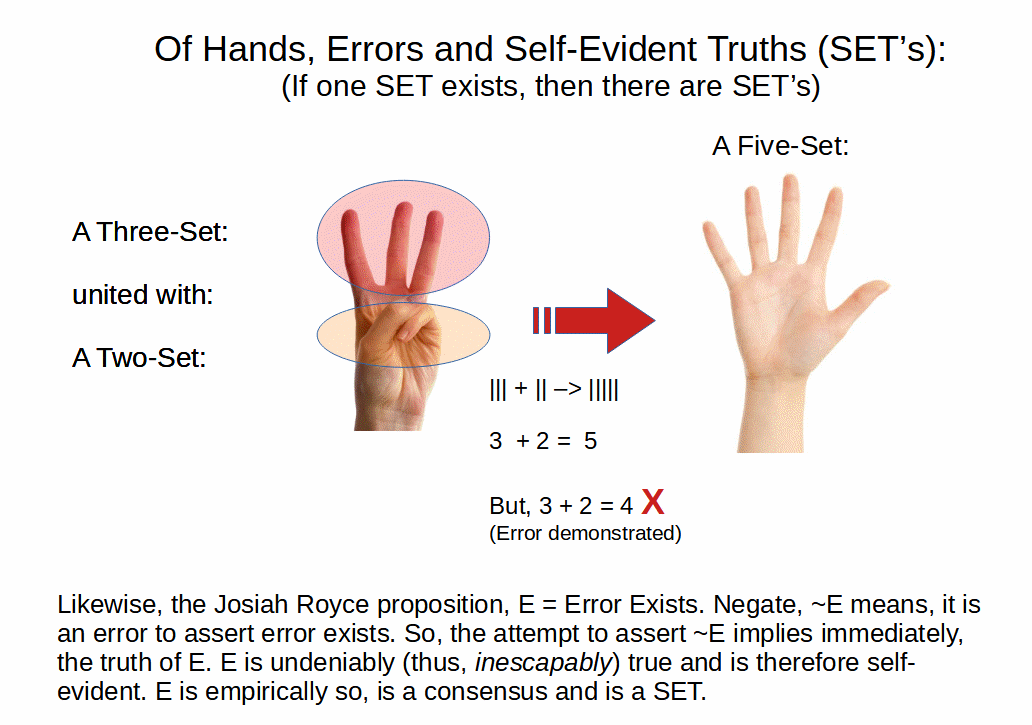
Notoriously, Winston Smith in 1984 is put on the rack to break his mind to conform to The Party’s double-think. He is expected to think 2 + 2 = whatever The Party needs at the moment, suppressing the last twisted answer, believing that was always the case, while simultaneously he must know that manifestly 2 + 2 = 4 on pain of instant absurdity. This is of course a toy example but it exposes the way crooked yardstick thinking leads to chaos:

(Yes, real lemmings do not act like that. But, humans . . . that’s a whole other story.)
So, now, let us turn to a recent barbed remark by one of our frequent objectors and my reply, laying out a frame of thought and inviting correction — dodged, of course:
KF, 120 in the Foundations thread: [[It is now clear that SG is unwilling to substantially back up the one liner insinuation he made at 84 above, try making a good argument. Accordingly, let me respond in outline, for record, to the general case, that people like us are ignorant, stupid, insane or wicked and the associated zero concessions, selectively hyperskeptical dismissiveness policy. Here, I will show the rational responsibility of the design inference and related ideas, views and approaches, for record and reference:
I will use steps of thought:
1: Reason, in general: Notice, supporters and fellow travellers of evolutionary materialistic scientism undermine the responsible, rational freedom required for reason to be credible. They tend to discount and discredit objectors, but in fact their arguments and assertions are self-referentially incoherent, especially reduction of mind to computationalism on a wetware substrate. Reppert is right to point out, following Haldane and others:
. . . let us suppose that brain state A [–> notice, state of a wetware, electrochemically operated computational substrate], which is token identical to the thought that all men are mortal, and brain state B, which is token identical to the thought that Socrates is a man, together cause the belief [–> concious, perceptual state or disposition] that Socrates is mortal. It isn’t enough for rational inference that these events be those beliefs, it is also necessary that the causal transaction be in virtue of the content of those thoughts . . . [But] if naturalism is true, then the propositional content is irrelevant to the causal transaction that produces the conclusion, and [so] we do not have a case of rational inference. In rational inference, as Lewis puts it, one thought causes another thought not by being, but by being seen to be, the ground for it. But causal transactions in the brain occur in virtue of the brain’s being in a particular type of state that is relevant to physical causal transactions.
2: This extends to Marx’s class/cultural conditioning, to Freud’s potty training etc, to Skinner’s operant conditioning , to claims my genes made me do it, and many more. So, irrationality and undermining of the credibility of reason are a general issue for such supporters and fellow travellers, it is unsurprising to see projection to the despised other (a notorious defence mechanism) and linked failure to engage self referentiality.
3: First principles of right reason: Classically, the core of reason starts with distinct identity, excluded middle, non contradiction. Something x is what it is i/l/o its core characteristics, nothing can be both x and not x in the same sense and circumstances, any y in W = {x| ~x} will be x, ~x, not both or neither. And more. Claimed quantum counter examples etc actually are rooted in reasoning that relies on such. And yes, there have been enough objections that this has come up and is in UD’s Weak Argument Correctives. We leave it to objectors like SG to tell us whether they acknowledge such first principles of right reason: _______ and explain why ________ .
4: Self evidence: There are arguments that, once we have enough experience and maturity to understand [a sometimes big if], will be seen as true, as necessarily true and as true on pain of immediate absurdities on attempted denial. That error exists is a good case in point, and if one is able to see that the attempt to deny objectivity of knowledge for a given reasonably distinct field of thought such as morals or history or reality [metaphysics], or the physical world, or external reality, or in general, etc, one is claiming to objectively know something about that field and so refutes oneself.
5: self referential incoherence and question begging: We just saw an example of how arguments and arguers can include themselves in the zone of reference of an argument in ways that undermine it, often by implying a contradiction. Such arguments defeat themselves. Question begging is different, it assumes, suggests or imposes what should be shown and for which there are responsible alternatives. Arguments can be question begging, and then may turn out to be self refuting.
6: Deduction, induction, abduction (inference to the best [current] explanation [IBE]) and weak-form knowledge: Deduction uses logical validity to chain from givens to conclusions, where if givens are so and the chain valid, conclusions must also be true. Absent errors of reasoning, the debate rapidly becomes one over why the givens. Induction, modern sense, is about degree of support for conclusions i/l/o evidence of various kinds as opposed to demonstration, statistics, history, science, etc are common contexts. Abduction, especially IBE, compares live option alternatives and what they imply, on factual adequacy, coherence and balance of explanatory power, to choose the best explanation so far. In this context weak sense common knowledge is warranted, credibly true (so, reliable) belief. Which, is open to correction or revision and extension.
7: Worldviews context: Why accept A? B. But why B? C, etc. We see that we face infinite regress, or circularity or finitely remote first plausibles . . . which, frame our faith points . . . as we set out to understand our world. Infinite regress is impossible to traverse in reasoning or in cause effect steps, so we set it aside, we are forced to have finitely remote start points to reasoning and believing, warranting and knowing — first plausibles that define our views of the world. Thus, we all live by faith, the question is which, why; so, whether it is rational/reasonable and responsible. Where, too, all serious worldview options bristle with difficulties, hence the point that philosophy is the discipline that studies hard, basic questions. Question begging circles are a challenge, answered through comparative difficulties across factual adequacy, coherence and balance of explanatory power: elegantly simple, neither ad hoc nor simplistic.
[Let’s add an illustration:]

[or in Aristotle’s words:]
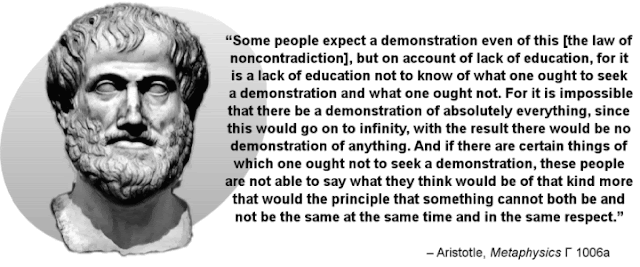
8: Failure of evolutionary materialistic scientism and fellow traveller views: It will be evident already, that, while institutionally and culturally dominant, evolutionary materialistic scientism and fellow travellers are profoundly and irretrievably incoherent. Yes, a view backed by institutions, power brokers in the academy, the education system and the media can be irretrievably, fatally cracked from its roots.
9: Logic of being (and of structure and quantity), also possible worlds: Ontology and her grand child, Mathematics, grow out of core philosophy, particularly distinct identity and consideration of possible worlds. A possible world, w, is a sufficiently complete description of how our world or another conceivable or even actual world is or may be; i.e. a cluster of core, world describing propositions. In that context, a candidate being or entity or even state of affairs, c, can be impossible of being [e.g. a Euclidean plane square circle] or possible. Possible beings may be contingent [actual in at least one possible world but not all] or necessary [present in every possible world]. We and fires are contingent, dependent for existence on many independent, prior factors; what begins or may cease of existence is contingent. Necessary beings are best seen as part of the fabric or framework for this or any possible world. We can show that distinct identity implies two-ness, thence 0, 1, 2. Ponder, W = {A|~A}, the partition is empty, 0, A is a unit, ~A is a complex unit, so we see 2. So, onward via von Neumann’s construction, the counting numbers N. Thence, Z, Q, R, C, R* etc in any w. This is what gives core Mathematics its universal power.
10: The basic credibility of the design inference: of course, we routinely recognise that many things show reliable signs of intelligently directed configuration as key cause, i.e. design. For example, objectors to the design inference often issue copious, complex text in English, beyond 500 to 1,000 bits of complexity. In the 70’s Orgel and Wicken identified a distinct and quantifiable phenomenon, functionally specific, complex organisation and/or associated information, which I often abbreviate FSCO/I. Organisation is there as things like a fishing reel [my favourite, e.g. the ABU 6500 CT] or a watch [Paley, do not overlook his self replicating watch thought exercise in Ch 2]

or an oil refinery or a computer program [including machine code]

or the cell’s metabolic process-flow network [including protein synthesis]
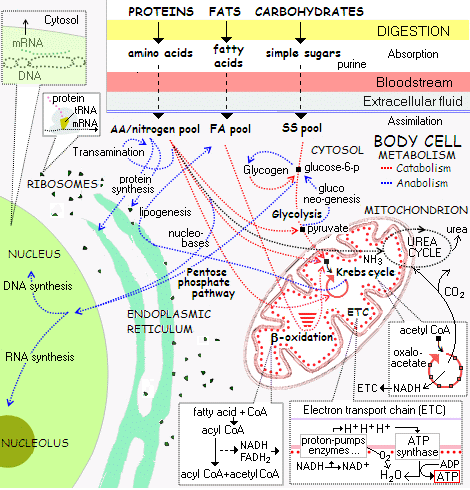
[with:]
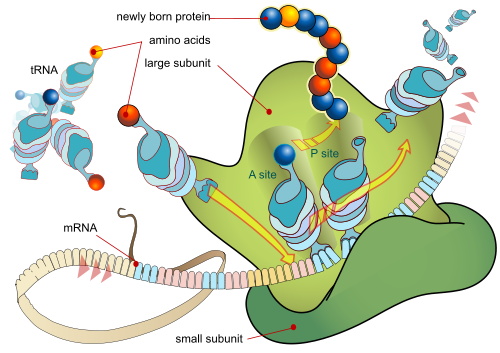
[and:]
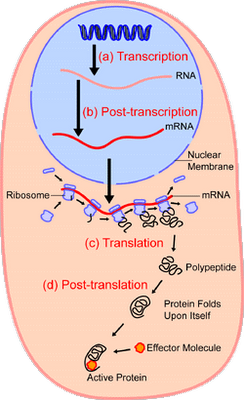
all can be described in a suitably compact string of Y/N questions, structured through description languages such as AutoCAD. The inference posits that, with trillions of cases under our belt, reliably, FSCO/I or its generalisation, CSI, will be signs of design as key cause. The controversies, as may be readily seen, are not for want of evidence or inability to define or quantify, but because this challenges the dominant evolutionary materialism and fellow travellers. Which, of course, long since failed through irretrievable self referential incoherence.
_____________________
So, challenge: let SG and/or others show where the above fails to be rational and responsible, if they can__________________ Prediction, aside from mere disagreement and/or dismissiveness, assertions, or the trifecta fallacy of red herrings, led away to strawmen soaked in ad hominems and set alight to cloud, confuse, poison and polarise the atmosphere, they will not be able to sustain a case for general failure to be rational and responsible.]]
The good argument challenge is duly open for response. END
U/D, Nov 4: As it seems certain objectors want to attack the descriptive metaphor, islands of function amidst seas of non function, let me put up here a couple of infographics I used some years ago to discuss this concept. But first, as the primary contexts have to do with protein synthesis and OoL, let me first put up Vuk Nicolic’s video illustrating just what is required for protein synthesis:
. . . and Dr James Tour’s summary presentation on OoL synthesis challenges:
Now, this is my framework for discussing islands of function:
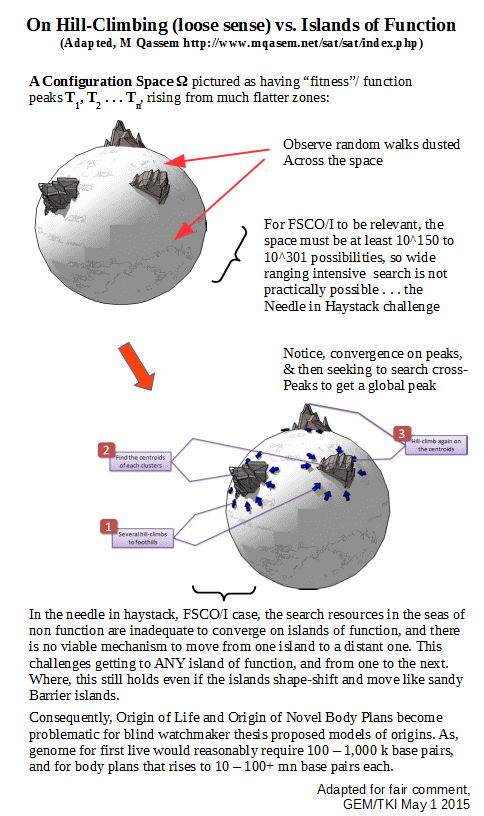
. . . and, on associated active information:
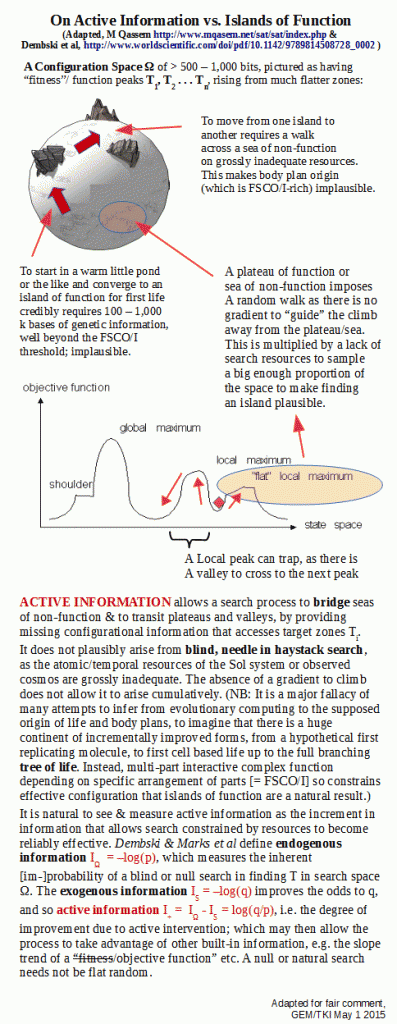
Thus, we can discuss the Orgel-Wicken functionally specific, complex organisation and associated information concept, FSCO/I, similarly:
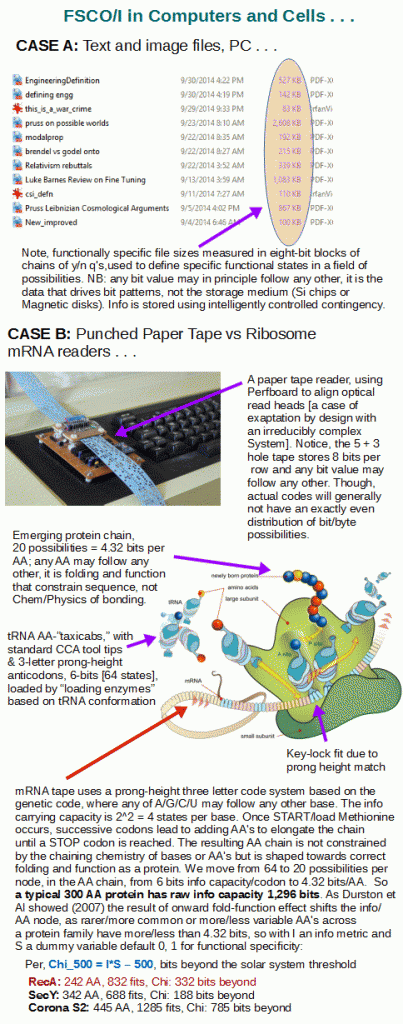
We see here the needle in a haystack, blind search challenge and how it is dominated by not the hill climbing on fitness functions that is commonly discussed but by the issue of arriving at shorelines of first function. Obviously and primarily, for origin of cell based life [cf. Tour] but also to move from that first unicellular body plan to others. Where, we can observe too that even within an island of function, incremental changes will be challenged by intervening valleys, tending to trap on a given peak or plateau.
But, what of the thesis, that there is in effect a readily accessible first functionality, incrementally connected to all major body plans, allowing unlimited, branching tree of life body plan level macro evolution?
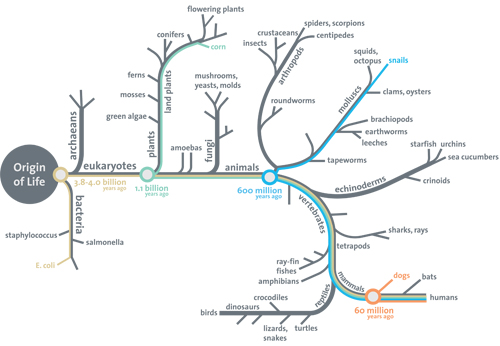
Obviously, this architecture implies such continuity. The first problem, obviously is the root and the plethora of speculations and debatable or even dubious syntheses that have been made into icons of the grand evolutionary narrative and taught as effective fact, already tell us something is wrong. A second clue is how the diagram itself implies that transitional forms should utterly dominate the space, with terminal tips being far less common. On basic statistics, we should then expect an abundance of these transitions or “links.” The phrase, missing link, tells the tale instead.
For, the trade secret of paleontology, is the utter rarity of such forms, to the point where punctuated equilibria was a major school intended to explain that general absence. Where, Darwin, notoriously, noted the gaps but expected and predicted that on wider investigations they would go away. But now, after 150 years of searching, billions of fossils seen in situ, millions in museum back office drawers [only a relative few can be displayed] and over a quarter of a million fossil species, the pattern of gaps is very much still here, hot denials and dismissals notwithstanding. That is especially true of the Cambrian fossil life form revolution, where the major current body plans for animals pop up with nary an intermediate. So much so, that there have been significant efforts to make it disappear, obfuscating its significance.
We also have molecular islands of function, starting with protein fold domains. Thousands, scattered across the AA sequence space, no easy path connecting them. Even just homochirality soon accumulates into a serious search space challenge as molecules are complex and mirror image handedness is not energetically enforced, why racemic forms, 50-50 mixes of left and right handed molecules are what we tend to get in lab syntheses. This then gets more complicated where there are multiple isomers as Tour discusses.
In short, a real issue not a readily dismissible notion without significant empirical support.
And so forth.
U/D2 Nov 4: I just found where I had an image from p. 11 NFL, so observe:
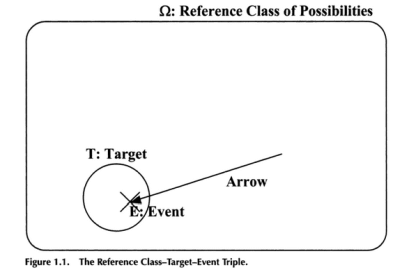
Where, we can further illustrate the beach of function issue:

And, some remarks:

U/D 3 Nov 7: The all-revealing Eugenics Conference Logo from 1912 and 1921 showing how it was seen as a capstone of ever so many sciences and respected domains of knowledge, especially statistics, genetics, biology and medicine, even drawing on religion, with, politics, law, education, psychology, mental testing and sociology . . . menacingly . . . also being in the roots:

U/D 4, Nov 10: A reminder on cosmological fine tuning, from Luke Barnes:

U/D 5, Nov 12: As there is dismissiveness of the textual, coded information stored in DNA, it is necessary to show here a page clip from Lehninger, as a case in point of what should not even be a debated point:

For record.
U/D 6, Nov 14: The per aspect design inference explanatory filter shows how right in the core design inference, alternative candidate causes and their observational characteristics are highlighted:
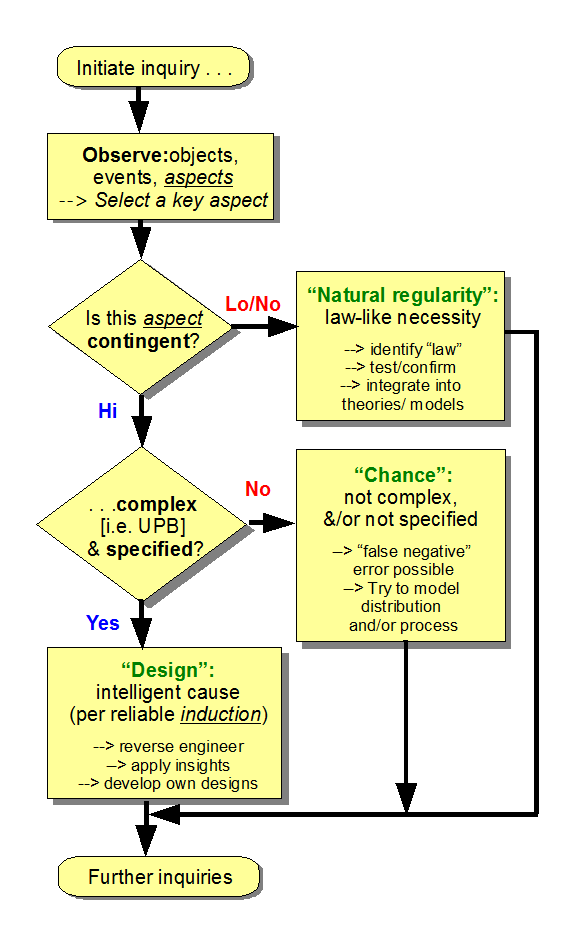
Again, for record.